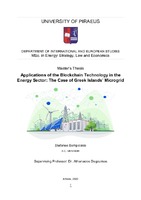| dc.description.abstractEN | Energy systems around the globe nowadays are undergoing a rapid transformation in their conventional structures that are vital from an environmental, economic, and social perspective. The driving forces behind the shift to the new era of the energy, also known as Energy 4.0, are the so-called 3 D’s: Decarbonization, Digitalization, and Decentralization.
The blockchain technology, which comes as a result of digitalization, is considered by many experts a transformative force for the energy sector. More specifically, it is believed that it can be a direct driver for the decentralization of energy systems as well as an indirect one for their decarbonization and further digitalization. This is due to the technology’s most prominent technical capacities, namely, transparency, security, and decentralization. All these combined have provided practical use cases, with the most widely-known being peer-to-peer power trading. On this occasion, consumers are enabled to trade the surplus amount of the energy they produce (e.g. with photovoltaics) with other consumers in decentralized energy networks. Such a solution can contribute to the decentralization of energy systems and make them more democratic and inclusive.
Most of the blockchain applications in the energy sector today have been directed towards the electric power industry, with more than half of blockchain use cases focusing on decentralized energy trading and energy projects financing. In contrast, the application of blockchain in the petroleum industry is still in its infancy. In the oil and gas sector, new technologies have to pass through several phases before mass adoption occurs, due to high costs and increased probability of component failures. Another deterrent is the particular nature of operations in the industry. For instance, oil is traded as a commodity on a global level and is impacted by external factors such as geopolitics, while electricity is specific to a regional level. Despite the sluggish adaptability of the industry, more recently, a number of blockchain initiatives from oil and gas majors have been launched.
Regardless of those advances and the fact that there is a growing number of startup companies developing similar solutions, blockchain is still in an exploratory phase of development. That is the main reason for it not being widely adopted by large industry players or in large-scale applications, which could otherwise help it grow faster and be established as a standard technology for particular applications. It will only become apparent in the next five to ten years, at a time when blockchain is expected to reach maturity from a technical standpoint, whether it will be a revolutionary technology that will bring about a revolution in the structure and processes of the energy industry.
This thesis aims at reviewing the main characteristics of blockchain technology, and based on its technical advantages, analyze the role it has played up to this day in the transformation of the energy industry and, more specifically, in the electric power and oil & gas sectors. In addition, a case study is presented that aims at showing how blockchain can provide solutions for the Greek energy ecosystem. | el |



